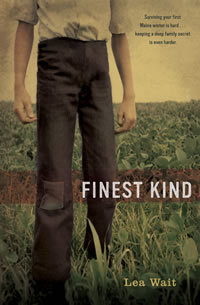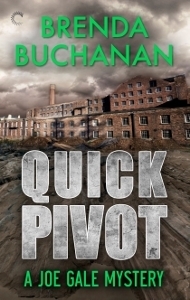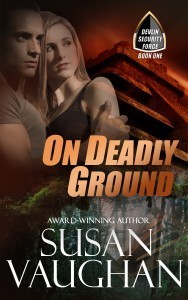Lea Wait's Blog, page 297
March 6, 2015
Weekend Update: March 7-8, 2015
 Next week at Maine Crime Writers there will be posts by Barb Ross (Monday), Jen Blood (Tuesday), Kate Flora (Wednesday), Susan Vaughan (Thursday), and John Clark (Friday).
Next week at Maine Crime Writers there will be posts by Barb Ross (Monday), Jen Blood (Tuesday), Kate Flora (Wednesday), Susan Vaughan (Thursday), and John Clark (Friday).
In the news department, here’s what’s happening with some of us who blog regularly at Maine Crime Writers:
Lea Wait: Loving that Daylight Savings Time has arrived … even if the snow is still here. I’m making two appearances this week — Tuesday, March 10, I’ll be speaking at the Freeport Community Library (Freeport, Maine) at 6:30 …. an event originally scheduled for January, but which was snowed out. And Wednesday, March 11, I’ll be speaking at the Lincoln Home in Newcastle, Maine, at 3 in the afternoon. Copies of my books will be available at both events, and both events are open to the public.
 Barb Ross: Kensington has made the bundle containing the first book in my Maine Clambake Mystery series, Clammed Up, the first book in Joanne Fluke’s series, Chocolate Chip Cookie Murder, and the first book in Lee Hollis’ series, Death of a Kitchen Diva, available for $2.99 for the three books. Joanne Fluke is Kensington’s most successful cozy author. Lee Hollis is actually a brother-sister team. He is a TV and movie writer and she is the food columnist for the local paper in Bar Harbor. Their mysteries take place in Maine.
Barb Ross: Kensington has made the bundle containing the first book in my Maine Clambake Mystery series, Clammed Up, the first book in Joanne Fluke’s series, Chocolate Chip Cookie Murder, and the first book in Lee Hollis’ series, Death of a Kitchen Diva, available for $2.99 for the three books. Joanne Fluke is Kensington’s most successful cozy author. Lee Hollis is actually a brother-sister team. He is a TV and movie writer and she is the food columnist for the local paper in Bar Harbor. Their mysteries take place in Maine.
An invitation to readers of this blog: Do you have news relating to Maine, Crime, or Writing? We’d love to hear from you. Just comment below to share. Don’t forget that comments are entered for a chance to win our wonderful basket of books and the very special moose and lobster cookie cutters.
And a reminder: If your library, school, or organization is looking for a speaker, we are often available to talk about the writing process, research, where we get our ideas, and other mysteries of the business. Contact Kate Flora: mailto: kateflora@gmail.com
March 5, 2015
Cleaning Up
Lea Wait, here. Last weekend I was relieved and delighted to send the manuscript of the third in my Mainely Needlepoint series, THREAD AND GONE, to my editor.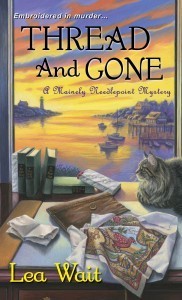 (What does it say about my publisher when they’ve finished the cover before I’ve written the book??)
(What does it say about my publisher when they’ve finished the cover before I’ve written the book??)
I posted my news on Facebook and mentioned that I was going to drink some champagne to celebrate, and then do some housecleaning. Perhaps not surprisingly, a number of my friends didn’t find this plan exciting enough. Or “frivolous” enough, as one friend put it. “Not fun!” I’d worked hard. Now should be time to play!
I like that idea, I assure you. But, realistically, I will feel much better and more relaxed after I take a week or so to catch up with some housekeeping. Or, in some cases, “desk keeping.”
I’m not someone who keeps a pristine house. But I will admit that when I was in college my dorm room was on the “usually safe to show to prospective students and their parents” list. My bed was made, and they were pretty sure they wouldn’t find a half a tuna sandwich or a pizza box on the floor.
Some of my dorm mates may have thought I was uptight. But, actually, I was being practical. I’d known from a very young age that a) I worked better when I was in control of my environment (e.g. room) and b) if my room was a mess I’d take the time to clean it — or at least straighten it up – before I did my homework. So — to keep up with school work, I needed to keep my room/world (relatively) neat.
Fast forward to today. Although when I’m in the midst of writing a book my desk will be covered with papers and books, as soon as I type “The End” … my tendency to cleaning and organizing my notes for that book … and my plans for the next one … kicks in.
I file my notes for the book I’ve just finished. I update my “character Bible” for the series. I check emails and schedules to make sure I haven’t forgotten anyone, or any thing, while I’ve been engrossed in writing. I’ll jot down any thoughts I’ve had for the next book in the series, before I forget them.
If I’ve really been in a “write” mode, the rest of the house may also need a bit of help.
So for the past week I’ve been sorting and updating my office files, and cleaning the house. Not dusting or vacuuming …. really cleaning. All the kitchen cabinets, especially those I didn’t do last spring. (Spices dated 2003 really have to go.) The bathroom cabinets. (Medications that have expired … out!) My top bureau drawer, stuffed with everything my cat likes to push off the bureau.
It’s all about finished. Next on my list is to outline another couple of books in my Mainely Needlepoint, in hopes of getting a new contract. And then getting to work on my next book in the Shadows series, which is due September 1.

Lea’s chair … waiting.
My drawers are now tidy, my file folders are labelled and easy to find.
And tonight I plan to take a long bath, and read Hank Phillippi Ryan’s TRUTH BE TOLD.
Tomorrow? I’ll start going through my “ideas” files for future books. Next project: here I come!
March 3, 2015
A Cozy Thriller?
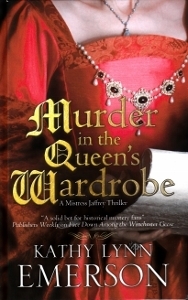 Kathy Lynn Emerson (aka Kaitlyn Dunnett) here, once again plugging Murder in the Queen’s Wardrobe. Next blog, I promise, Kaitlyn will be back with something more contemporary than the sixteenth century. But for today, one last post about my new historical mystery, which is (drum roll please!) now officially available in hardcover and in ebook format for your Kindle or Nook.
Kathy Lynn Emerson (aka Kaitlyn Dunnett) here, once again plugging Murder in the Queen’s Wardrobe. Next blog, I promise, Kaitlyn will be back with something more contemporary than the sixteenth century. But for today, one last post about my new historical mystery, which is (drum roll please!) now officially available in hardcover and in ebook format for your Kindle or Nook.
Here’s the thing: if you look at the book description provided by the publisher, you’ll see that although it is clearly “A Mistress Jaffrey Mystery” it is also described as “an Elizabethan spy thriller.” The first time I saw this, I was a bit taken aback. You see, I thought I’d written a cozy.
Can the same novel be both?
 There is a lot of debate about what, exactly, a cozy mystery is. I tend to use a broader definition that some folks do, not quite equating it with a “traditional” mystery, but almost. My list of attributes, with tongue only slightly in cheek, is as follows:
There is a lot of debate about what, exactly, a cozy mystery is. I tend to use a broader definition that some folks do, not quite equating it with a “traditional” mystery, but almost. My list of attributes, with tongue only slightly in cheek, is as follows:
an amateur sleuth
Check. Rosamond Jaffrey is a young gentlewoman in Elizabethan England.
no gratuitous sex or violence
Check. There’s no sex at all and the murder is committed off the page. There is some description of death throes, but nothing too ghastly.
minimal amounts of other things people are likely to find offensive, like bad language
Check. Elizabethan curses tend to be amusing rather than vulgar, at least to a modern readership, which is an entirely different problem for writers.
a personal relationship for the detective, usually romantic
Check. Rosamond has a husband from whom she is estranged but she still has feelings for him.
a cat
 Check. His name is Watling. He has one damaged ear. This is Feral. Hey—my other two cats appear as “Lumpkin” and “Glenora” in the Liss MacCrimmon books. Poor baby was feeling left out.
Check. His name is Watling. He has one damaged ear. This is Feral. Hey—my other two cats appear as “Lumpkin” and “Glenora” in the Liss MacCrimmon books. Poor baby was feeling left out.
Moving on to what a thriller is, this was a real puzzler for me until I discovered that in Great Britain, where my publisher is located, the term “thriller” is sometimes used for all mystery novels. Other definitions include the following:
full of exciting action, mystery, adventure, or suspense
Check.
keeps the audience on the edge of their seats
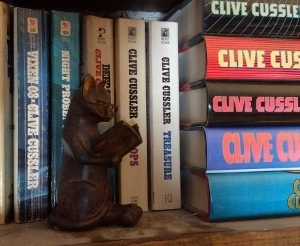 Hmmm. There are times, I hope, when this is true, but I wouldn’t say the whole novel is just one gasp after another. Murder in the Queen’s Wardrobe isn’t the movie Speed, nor is it one of Clive Cussler’s classic Dirk Pitt adventures like Sahara or Dragon.
Hmmm. There are times, I hope, when this is true, but I wouldn’t say the whole novel is just one gasp after another. Murder in the Queen’s Wardrobe isn’t the movie Speed, nor is it one of Clive Cussler’s classic Dirk Pitt adventures like Sahara or Dragon.
a suspenseful, sensational story
I have the suspense part covered, but sensational? I’m not entirely certain what that means but I’m thinking I’d better not put a check mark next to it.
a novel, play, or movie with an exciting plot, typically involving crime or espionage
Check. My novel has murder, attempted murder, treason, and espionage. Rosamond is recruited as an intelligence gatherer by the queen’s spymaster . . . but don’t expect special effect chase scenes. She’s not 007.
The International Thriller Writers, who put on the annual Thriller Fest in New York City, state that thrillers include, but are not limited to, the following types of novels: murder mystery, detective, romantic suspense, horror, supernatural, action, espionage, true crime, war, and adventure. Given that definition, I guess I just might be a thriller writer, after all . . . with a heaping helping of cozy thrown in.
March 2, 2015
Let It Snow…Not
 We’ve had eleven feet of snow here in Eastport over the past few weeks, and things have been going along pretty much as you’d expect. Every vehicle with a plow on the front or a bed in the back has been put to work moving the stuff at least enough so that people can get in and out of their houses, have fuel delivered, and make some reasonable attempt to go about daily life. But dear heaven, folks are getting tired. Everyone’s shoulders and elbows are stiff and tender, their feet all roughed up by their boots and their faces reddened from cold. Which did I mention it has also been the coldest time, too? Getting those fuel deliveries is no joke. One blessing is that the power has stayed on except for one three-house period, about which I will have more to say later.
We’ve had eleven feet of snow here in Eastport over the past few weeks, and things have been going along pretty much as you’d expect. Every vehicle with a plow on the front or a bed in the back has been put to work moving the stuff at least enough so that people can get in and out of their houses, have fuel delivered, and make some reasonable attempt to go about daily life. But dear heaven, folks are getting tired. Everyone’s shoulders and elbows are stiff and tender, their feet all roughed up by their boots and their faces reddened from cold. Which did I mention it has also been the coldest time, too? Getting those fuel deliveries is no joke. One blessing is that the power has stayed on except for one three-house period, about which I will have more to say later.
On the plus side, the plow operators are making money. Gasoline prices weren’t so high that they ate up all the profits, either, and that’s a big deal around here. When you buy one of those things you make a sizable investment, hoping to make it pay off, and a snowy winter can mean you don’t have to take the payments out of the household budget, or worse. What we haven’t seen much of is snow shoveling businesses springing up. People who do their own get to it pretty quick, and an organized army of volunteers had done a lot of the rest, descending with shovels and a front-loader upon the front walks and driveways in Eastport.
In nearly twenty years we’d never had a frozen pipe, but when the power did go off it was windy and frigid outside, so a (to put it kindly) somewhat less than well-insulated radiator pipe froze. (This is, after all, a Very Old House.) We tried our best to thaw it with a hair dryer, late at night while crouched in the horrid, cobwebby crawlspace under the ell. But no luck, so we thought about how much fun a burst pipe was going to be in the morning, then called the plumber at the earliest hour we thought was even halfway decent once the sun rose. Meanwhile of course with no heat in the ell, more and more of the pipe was freezing. But…!
The woman who answered the phone was calm and pleasant. She said they’d have someone over right away, and they did. He said he would not use a (gasp!) blowtorch near any wood. (This Old House is so old and dry, you could light it up with a match.) And although it took awhile, when he was done not only was the heat back on in the ell, the house was not on fire! And I don’t know about you but in my opinion, both those things being true at one time is pretty darned pleasant, especially after a night of worrying about a flood that (a) can’t be turned off without also turning off ALL the heat in the house, and (b) freezes instantly.

Meanwhile I have finished a book, and if you have ever done so you know the mixture of elation and utter, wrenching discombobulation that doing this can cause. A couple of days ago I was fully engaged in an all-consuming activity, cursing loudly and fluently while wrestling some stubborn plot detail to the mat (global search and replace, anyone?). And now it’s…gone!
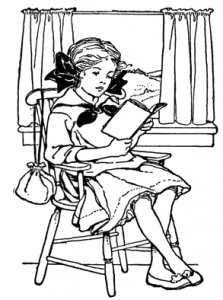 So I did something revolutionary. I…I read a book. A whole one, all the way through, and while I read it I did not think about my own book AT ALL. I read it in a couple of huge, obsessive gulps, the way I used to do when I was a kid and you could stand right there and talk to me and I wouldn’t hear you, I was so absorbed. (And have we had enough of the first person singular, now?) Anyway, it was such a treat. The book may or may not have been good. I couldn’t tell you. I do know the ending came out of left field, in my opinion. If you’re going to shoot off a shotgun and have it malfunction in the final scene you’d better do more than hint about it being broken early on in the book, it seems to me. But no matter. The pleasure of reading that way at all is something I can’t achieve while I’m writing, and besides being fun it was also a great reminder of why we do what we do. It’s so other people can have that fun, too.
So I did something revolutionary. I…I read a book. A whole one, all the way through, and while I read it I did not think about my own book AT ALL. I read it in a couple of huge, obsessive gulps, the way I used to do when I was a kid and you could stand right there and talk to me and I wouldn’t hear you, I was so absorbed. (And have we had enough of the first person singular, now?) Anyway, it was such a treat. The book may or may not have been good. I couldn’t tell you. I do know the ending came out of left field, in my opinion. If you’re going to shoot off a shotgun and have it malfunction in the final scene you’d better do more than hint about it being broken early on in the book, it seems to me. But no matter. The pleasure of reading that way at all is something I can’t achieve while I’m writing, and besides being fun it was also a great reminder of why we do what we do. It’s so other people can have that fun, too.
March 1, 2015
Is Millinocket Memorial Library the Canary in the Coal Mine?
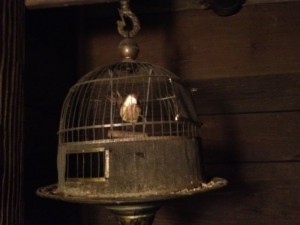
I’d much rather work in a library
John Clark here, sharing a recent experience as well as some other scary possibilities facing the Maine library community. I was invited to be part of a brainstorming panel that met in the Millinocket town hall and discussed ideas and strategies that community members could use to keep their wonderful library from being closed completely. I don’t think I need to go into great depth about the fiscal struggles that town and those nearby are dealing with. If you drive through, you quickly notice how many homes are for sale and how many appear to be uninhabited. They’ve lost their paper mill which was a mainstay for a very long time and the trickle-down effect wasn’t anywhere close to the type Ronald Reagan tried to sell us.
As for the library, it wasn’t that long ago when the director worked a 40 hour week and the library was open 34. To do their part as a municipal department, the director, Lori Fitzgerald and her staff cut back severely, to a point where the library is open 15 hours weekly and the childrens librarian and the other staff member work 9 hours each week. The drastic cuts saved $46,000 in wages in 2014, but even that may not be sufficient to save it from closure. I can attest to the fact that it’s extremely busy, even if open very limited hours. There was a program for kids going on downstairs and an older group was meeting upstairs. The public access computers were in use and to my great delight, as I chatted with the staff because I arrived early to be certain I would find the right location, a lady approached the desk to return three books. As she passed them over, she said, “and I’m here to pick up Death Dealer which is on reserve for me.”

Millinocket Memorial Library
I turned to her and grinned. “My sister wrote that book.” A lively discussion between the patron, myself and the staff about Kate’s books ensued. It’s always great fun when moments like these happen here in Maine. One of my other habits when visiting libraries is to browse the sale rack if they have one and buy what looks interesting or salesworthy. I bought 12 books for a dollar each before heading down to the town hall.
There were five panelists, me, author and columnist (as well as a trustee for the Dr. Shaw Memorial Library in Mount Vernon) George Smith, Valerie Osborne, current library consultant for the Northeastern Library district and former long time director of the Old Town Public Library, Hildie Lipson, former Executive Director of MaineShare and former Chair of a highly successful capital campaign at the Cary Memorial Library in Wayne with 30 years of fundraising experience, and moderator Chet York who put the evening together. There were 20 or so in the audience and the panel discussion was live-streamed over the local cable access channel.
First, let me say that I was greatly honored to be invited. I do have some pretty successful experiences in library promotion and I am always grateful when an opportunity to give something back to a profession that has treated me so well, comes my way. Losing your library does far more to a town than even those intimately involved can imagine until it has happened and then it’s too late. I’ll get to some of them after I share what we panelists came up with.

A dead paper mill is sad and scary.
After we were introduced, Chet asked each of us specific questions that he’d given us in advance so we could have time to think of our best bits of advice. In terms of value of the library to a community, George noted that children in towns with public libraries do better academically. He also noted that libraries are natural breeding grounds for future writers and that writing groups aimed at kids are a valuable program that libraries offer. (I’m on board with that, the time that I offered a class for teen writers, one girl went on to write for a local newspaper while still in high school.)
Hilde’s experience as a fundraiser came in the form of this observation: Wayne’s population is 1,000; increases to 2,000 in summer. Cary Memorial Library is a nonprofit. Total budget is $64,000; they get $6,000 from Town. An annual Appeal Letter is bringing in $15,000 at this point. First rule of fundraising: Ask! Give examples of what money will be used for. Send Thank You’s within 24 hrs. Give many donation levels. They have 15-20 funding sources, including book sales 3 times per year (raising ~ $4,000/yr.). George agreed and added the following. He suggests sending 3 letters per year, increasing the amount asked for. Build relationships! He also suggested drawing on locally skilled people to do high-interest seasonal fundraisers. As an example, he talked about an amateur mycologist who gives mushroom walks at different times of the year as a fundraising activity for the library in Mount Vernon.
George suggested talking to big donors face to face when asking for money, while Hilde noted that it’s a big deal to hand write short notes on Appeals letters as well as on thank you letters to prior donors, mentioning those gifts and what they were used for.
I shared some things I learned in my stint as the library director in Boothbay Harbor and that I’ve continued to do in Hartland when I’ve had the chance. You need to say affirmatively and often to regular patrons, “When you die, we better be in your Will!” This was something I didn’t do often or well in Boothbay Harbor and I watched the big nonprofits haul in over six million while we got a paltry $2000 in bequests. Publicity with a regular newspaper article is a gold mine if you have one that will carry your writing. I had one for the five years I was in BBH, and it ran weekly. I had a similar one in a weekly newspaper published in Newport until it went out of business. Use print, Facebook and blogs to let people know what you need (e.g. supplies, compost, shelving school stuff, gifts for the annual Fireman’s Auxiliary Christmas gift program, etc.). You can’t get what people don’t know you need.

Mt. Katahdin is awesome from any viewing angle.
“Sell the value of what people gave.” When I get a donation of books, DVDS, etc. I make sure I tell the giver exactly what happens to anything they bring in. Here’s a perfect example, Terry, the guy who manages the town transfer station and I went into a dumpster after he realized the guy who had dumped 8 big boxes of books removed from a retired minister’s house HAD NOT offered them to me first as he had claimed. We rescued enough to fill the back of my Chevy hatchback and I put any that were in decent condition on Amazon. That load of ‘trash’ has netted in excess of $500 for the library DVD collection. Every time I sell another one I make a point of telling Terry and thanking him again. In 2014, I made $4,500 for the library selling donated and discarded books on Amazon. I also gave away 700 children’s books per year that came from donated stuff. People are far more likely to give a second and third time when they’re told exactly how their stuff benefits the library.
These observations led to a flurry of brainstorming that pulled in some comments from the audience as well as more ideas that have worked elsewhere. Here’s a list of some of them: Invite a bunch of teens/tweens to the library and have them brainstorm what they really want the library to offer. Valerie noted that when she did this at Old Town, three things that came out of it and were extremely successful, not to mention quite surprising were ballroom dancing (ten couples paid a nominal fee for a ten week session), meeting with a psychologist who helped them sharpen their skills in the area of assertiveness and communication with their parents, and a live simulated courtroom experience where they recreated trials that fascinated them.
Other cool ideas included a teen writing contest, determining the cost of supporting one hour of library operation and inviting local donors to sponsor library time for a specific period of time. Kate and her husband Ken did this for the Concord, MA. Public library several years ago when the Saturday hours for the summer were eliminated. One idea we hope to pull off this summer in Hartland, but that I neglected to mention is a sidewalk art show for teens. We’re hoping to get discarded cardboard, wallboard and plywood so kids can do some creative graffiti and art and win prizes.
See if you can work with the local bottle redemption center to agree to accept returnables and put the $$ in a library account. Before the redemption place in Hartland closed. We had such a deal in place for the town swimming pool.
Another area we talked about a lot was the recruitment and use of volunteers. Small public libraries can’t operate without them. Library staff, particularly directors should develop a bucket list of tasks of all complexity levels that they’d love to get done, but probably won’t have time to complete. Valerie suggested creating volunteer job descriptions and said she had done this at Old Town. Involving kids in volunteer activities is a big way to get the word out there that you have a kid friendly library and that their wants and interests are valued.
I also suggested that creating a display that gave citizens an idea of what would be lost if the library closed, would help non-library users realize just how much a library provides to the community. This year, for example, both the IRS and Maine Revenue Service cut way back of sending out tax forms and booklets. That left Maine’s public libraries as a primary, if not the primary source for anything dealing with taxes. At the Hartland Public Library, we have at least two people every day use our public access computers to file their income taxes. Close the library and where can they go?
The same applies for wireless internet access. We offer 20 megabits of bandwidth that Valerie says is going to increase greatly this summer (by as much as a factor of ten). Granted in towns where McDonald’s, Tim Hortons, etc operate, there are other wireless options, but in towns like Hartland, Solon, Bingham and Canaan, we’re the only game in town. For people who are vacationing or who live so far out that DSL isn’t an option, being able to sit on our front steps or in their car and use our free internet connection is a very big deal. Close the library ant it goes away as well.
Most job applications are now accessed through the internet. Sure, someone in Hartland or similar small towns can drive the 20 or so miles to access computers at a career center, but when you’ve been out of work for six months, the cost of gas to go there might be a deal breaker. In addition, librarians are extremely well versed in answering questions in ways that make people feel comfortable instead of stupid, so we have ways of helping people’s stress levels subside. Close the library and this goes away as well.
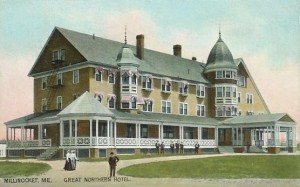
From a much slower and more prosperous time.
Ever hear of MARVEL? If not, shame on you. It’s an amazing collection of databases purchased by the Maine State Library, Maine Infonet and the University system. Librarians use it all the time and are well versed in helping people find what they need very quickly. Need five peer reviewed articles on bipolar illness in full text? Piece of cake. Want to see which of your ancestors can be found in Ancestry.com? Easy as pie. Granted experienced researchers can dig into these without our help, but students and family members reeling from the news that someone they care about just got diagnosed with something they never heard of, are more in the ‘deer in the headlights’ category. We can help them quickly and efficiently. Close us and this goes away s well.
Like movies or TV series, but can’t afford Red Box rentals or Netflix? Fear not, most libraries have decent DVD collections (in Hartland we have an absolutely decadent one). If your local library doesn’t have the one you want, they can easily borrow it from another library and have it within a week at little or no cost to you. The same goes for almost any book you want to read. Shut your local public library and this goes away as well.
The reason I headlined this blog entry asking if Millinocket was the canary in the coal mine is because they ARE NOT the only Maine library in jeopardy of closing. How do you think the closing of the mill in Bucksport will affect their library? There is, however, a much greater threat looming over every library that depends upon town financial support. The governor’s proposed cut in local revenue sharing, if passed, will kill off more small libraries than anyone unfamiliar with the library system and the magnitude of decrease per town can imagine. Don’t believe me? Go here and see for yourself. http://www.memun.org and scroll down until you see 01/23/2015 – 2016 Municipal Revenue Sharing Figures and click to download the spreadsheet.
Hartland, for example has a population of 1782 and would get cut by 174, 583, or almost $100 for each person in town. I’ve been involved at the town level long enough to know there’s no way in hell that the library’s funding won’t go away if this cut goes through. There simply isn’t enough flexibility for anything else to happen. If you’re a Maine resident, please take time to look at the numbers for your town and then pick up the phone and call your legislators.
February 27, 2015
Weekend Update: February 28-March 1, 2015
 Next week at Maine Crime Writers there will be posts by John Clark (Monday), Sarah Graves (Tuesday), Kaitlyn Dunnett/Kathy Lynn Emerson (Wednesday), Vicki Doudera (Thursday), and Lea Wait (Friday).
Next week at Maine Crime Writers there will be posts by John Clark (Monday), Sarah Graves (Tuesday), Kaitlyn Dunnett/Kathy Lynn Emerson (Wednesday), Vicki Doudera (Thursday), and Lea Wait (Friday).
In the news department, here’s what’s happening with some of us who blog regularly at Maine Crime Writers:
from Kathy Lynn Emerson/Kaitlyn Dunnett: I mentioned last time that the short story nominees for this year’s Agatha award have launched a blog tour. In addition to a group post here in April (date forthcoming) here is the schedule:
March 6 at Wicked Cozy Authors
March 17 at Writers Who Kill
April 20 at The Stiletto Gang
And the links to read all five stories can be found at the Malice Domestic website. Just click on “Awards” and scroll down to the short story category.
I’m also a guest blogger this week to promote the new mystery novel. I talk about a day in the life of Rosamond Jaffrey, the sleuth in Murder in the Queen’s Wardrobe at Dru’s Book Musings on March 3. Come by and comment and be entered in a drawing for a hardcover copy of the book.
from Lea Wait: This weekend I’ll be pushing the keys to send Thread and Gone, the third in my Mainely Needlework series, to my editor. And Friday, March 6, I’ll be visiting students at the Juniper Place School in Alna, Maine, who’ve read my book Finest Kind.
An invitation to readers of this blog: Do you have news relating to Maine, Crime, or Writing? We’d love to hear from you. Just comment below to share. Don’t forget that comments are entered for a chance to win our wonderful basket of books and the very special moose and lobster cookie cutters.
And a reminder: If your library, school, or organization is looking for a speaker, we are often available to talk about the writing process, research, where we get our ideas, and other mysteries of the business. Contact Kate Flora: mailto: kateflora@gmail.com
February 26, 2015
Mill Town Tales
Please welcome our special guest, Maine crime writer Brenda Buchanan.
Mill Town Tales
In 1971, when I was old enough to start noticing things beyond my own nose, a writer named Doris Kirkpatrick wrote a history of my hometown. Published by the local historical society, The City and the River was 453 pages of text, photographs and illustrations about Fitchburg, Massachusetts, the mill town 40 miles northwest of Boston where I’d spent my entire young life.
 Until Kirkpatrick’s book provided me the context, I had little sense of the go-go Fitchburg where paper, shoes, guns, textiles, saws and motorcycles once had been manufactured and shipped the world over. The ‘burg I knew was scuffed around the edges, infamous for the sulphurous stench of its paper mills and its multi-hued river. Though it had been on the decline for decades, the town still was peopled by first- and second-generation immigrants who held out hope it would regain its status as a hub of commerce and industry. The stories and photos in The City and the River gave me perspective on them, and on the institutions that had been endowed by the families that built Fitchburg’s once-robust economy.
Until Kirkpatrick’s book provided me the context, I had little sense of the go-go Fitchburg where paper, shoes, guns, textiles, saws and motorcycles once had been manufactured and shipped the world over. The ‘burg I knew was scuffed around the edges, infamous for the sulphurous stench of its paper mills and its multi-hued river. Though it had been on the decline for decades, the town still was peopled by first- and second-generation immigrants who held out hope it would regain its status as a hub of commerce and industry. The stories and photos in The City and the River gave me perspective on them, and on the institutions that had been endowed by the families that built Fitchburg’s once-robust economy.
The hospital where I was born—set high on a hill where we kids were free to ski and toboggan during the winter despite the danger posed by cars whizzing by on the busy street below—was named after the Burbank family, which had established Fitchburg’s first paper mill.
The athletic field where I watched home football games was built by the Crockers, who merged their fledgling company with Burbank Paper in the 1820s and built a ten-mill complex that was at one time the largest paper mill in the United States.
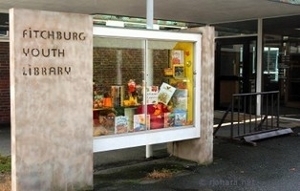 The Wallace Library—which had a separate children’s wing starting in 1899—was a gift to the town from another prominent family engaged in the manufacture of paper. At age four I became the proud owner of a youth library card and spent countless afternoons in that building’s warm, bookish embrace.
The Wallace Library—which had a separate children’s wing starting in 1899—was a gift to the town from another prominent family engaged in the manufacture of paper. At age four I became the proud owner of a youth library card and spent countless afternoons in that building’s warm, bookish embrace.
When the philanthropic families that had bestowed Fitchburg with its hospital, playing fields and library sold their mills to giant corporations, the same ugly spiral that occurred in Maine’s mill towns happened in mine. Work was shifted to states with lower labor costs. Hours were cut back. The new owners demanded contracts be restructured. Unions went on strike. Mills downsized, then closed.
 My parents didn’t work in the mills, but as the owners of a small service business they had plenty of customers who did. In the summer of 1972 my father was busy installing and maintaining oil burners, but a prolonged paper mill strike forced him to parse through his invoices at the end of the month. He sorted them into two piles—people whose income likely wasn’t affected too much by the strike and those who were walking a picket line. Ignorant of the etiquette required in such a circumstance, I asked why we were holding some bills back. “You don’t send a customer a bill you know they can’t pay,” my dad said. “Those bills can keep until the strike is over.”
My parents didn’t work in the mills, but as the owners of a small service business they had plenty of customers who did. In the summer of 1972 my father was busy installing and maintaining oil burners, but a prolonged paper mill strike forced him to parse through his invoices at the end of the month. He sorted them into two piles—people whose income likely wasn’t affected too much by the strike and those who were walking a picket line. Ignorant of the etiquette required in such a circumstance, I asked why we were holding some bills back. “You don’t send a customer a bill you know they can’t pay,” my dad said. “Those bills can keep until the strike is over.”
My father’s words illuminated one of the central truths I learned growing up in a mill town on the downswing—we were all in it together. Kind of like a marriage: for better or worse, in good times and in bad.
Other Maine writers who grew up in mill towns have described this same feeling with powerful eloquence. Monica Wood’s memoir When We Were The Kennedys captures the tight-knit world of Mexico, Maine and the common sense compassion provided by her neighbors in times of terrible loss. Richard Russo’s protagonist Miles Roby toils under Mrs. Whiting’s weakening thumb in Empire Falls, paying the price for real and imagined sins of others in the past-its-prime town of the same name.
I moved away from my hometown long ago, but on some level you never really leave the place that hatched you. My books are set in Riverside, Maine, a faded textile mill town west of Portland on the banks of the imaginary Cascabago River. It’s best described as an amalgamation of a number of Maine towns—Biddeford, Lewiston, Westbrook, Skowhegan, Bucksport, Old Town and Millinocket, with a little Fitchburg thrown in for good measure.
 My mythical Riverside hit bottom many years ago, but in the past decade it has begun to fight its way back. By the summer of 2014 a young developer announces plans to renovate the long-shuttered Saccarappa Textile Mill into condos, artist studios and an all-local brew pub designed to pull the hipsters west from Portland.
My mythical Riverside hit bottom many years ago, but in the past decade it has begun to fight its way back. By the summer of 2014 a young developer announces plans to renovate the long-shuttered Saccarappa Textile Mill into condos, artist studios and an all-local brew pub designed to pull the hipsters west from Portland.
Portland Daily Chronicle reporter Joe Gale is touring the defunct Saccarappa when a long-dead body is discovered bricked behind a wall, putting the mill renovation on hold and a cold case investigation into high gear. Fueled on caffeine to stay ahead of the Tweeters and Facebookers who are a modern reporter’s competition, Joe works the story hard, ignoring signals that someone is tracking his every move. When his prime source vanishes, Joe fears his tenacity has provoked another murder, this time to conceal four decades of deceit.
Quick Pivot will be released April 27—two months from today(!)—by Carina Press, a digital first publisher. I hope readers of this blog who are fans of mill towns, newspapers and traditional mysteries will look for it wherever e-books are sold, and will come see me when I visit your local library this coming spring and summer so we can continue the conversation.
Brenda Buchanan is a former newspaper reporter with a deep reverence for small town journalism. Her Joe Gale Mystery Series features an old-school reporter with modern media savvy who covers the Maine crime beat. Brenda worked as a reporter trainee at the Boston Globe while an undergraduate at Northeastern University. She was a reporter and columnist at the York County Coast Star in Kennebunk before attending law school at the University of Maine. Now a Portland lawyer with a daily writing habit, Brenda lives with her spouse in Westbrook.
Brenda can be found on the web at www.brendabuchananwrites.com , on Facebook and on Twitter at @buchananbrenda.
February 25, 2015
Where Are You Ronnie Jay?
Vaughn Hardacker here: Several years back I was a member of a writer group that met monthly at the public Library in Exeter, NH. The group had no rules about what type of writing members had to write (I also belonged to another group that met weekly, but was comprised exclusively of mystery writers) and since the venue was a public library it was open to anyone who wanted to attend–including poets.
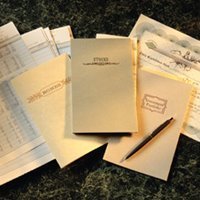 I have to confess that I cannot write poetry, nor do I read it nor do I understand it. I belong to a group today in which there are several poets and each time they read something I am absolutely lost. In fact, what usually happens is that I listen to the comments made by my fellow writers and always ask myself, “How did they draw that conclusion from what was read?” I’m a hard-boiled kind of guy and the nuances of poetic language, as well as the art form are lost on me.
I have to confess that I cannot write poetry, nor do I read it nor do I understand it. I belong to a group today in which there are several poets and each time they read something I am absolutely lost. In fact, what usually happens is that I listen to the comments made by my fellow writers and always ask myself, “How did they draw that conclusion from what was read?” I’m a hard-boiled kind of guy and the nuances of poetic language, as well as the art form are lost on me.
Now, let’s talk about the subject of this blog. I recall watching Ronnie Jay when he entered our group for the first time. He was dressed in a cowboy hat and boots and told us that he had recently relocated to New Hampshire from Nashville where he wrote country music songs. I immediately visualized hearing odes to a horse, laments about lost dogs, whiskey drinking, trains, pickup trucks, and of course women grieving for their husbands and boyfriends who were doing time. To get to the point, Ronnie didn’t read anything that night, but promised to have something when he came back the next month.
He sat quiet through most of the next meeting and when his turn came he said, “I wrote a little poem about writing that I’d like to read.” A few seconds later I was astounded. Ronnie had written the first poem that I could not only appreciate, but also understand. Here’s that poem:
The Unknown Writer
By
Ronnie Jay
© 2004
I’m an unknown writer
Creative as they come
But, there’ll come a day, I dare say
I’ll be a famous one.
I’ll write a #1 best-seller
And oh, the riches it will bring,
It’ll sell more in every bookstore
Than Grisham, Crichton, or King.
I know you won’t believe me
And I can’t make you a believer,
But, if I don’t believe in myself
No one else will either.
Yes, I know it sounds impossible
To reach those heights of fame
And I realize that I may never
Be a household name.
But, it doesn’t really matter
If my dreams do or don’t come true,
I’m still gonna keep on writing
Because that’s what writers do
Ronnie disappeared from our lives shortly after that. We assumed that he had gone back to Music City, but if by chance you should read this blog, Ronnie. Leave me a comment and I’ll get in touch.
February 24, 2015
It’s Just Your Imagination
Kate Flora here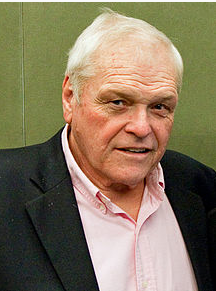 deeply immersed in the next Joe Burgess, And Led Them Thus Astray. Since I spend much of the time when I’m not writing my own books editing other writers or teaching writing, I’m always acutely aware of the pitfalls that arise for writers in the course of their storytelling. Among the biggest is letting the reader see the characters and action without slowing the momentum of the story. A common problem is doing a huge data dump to let the reader know all the cool lore that the writer has learned in order to write the story. Another place problems frequently arise is in description.
deeply immersed in the next Joe Burgess, And Led Them Thus Astray. Since I spend much of the time when I’m not writing my own books editing other writers or teaching writing, I’m always acutely aware of the pitfalls that arise for writers in the course of their storytelling. Among the biggest is letting the reader see the characters and action without slowing the momentum of the story. A common problem is doing a huge data dump to let the reader know all the cool lore that the writer has learned in order to write the story. Another place problems frequently arise is in description.
How often have we seen a writer try to describe a character by writing something along the lines of: She tossed back her streaming raven curls and compressed her glistening full, red lips together as she tried not to smile at his approach?
Kate Flora the editor always makes a little note in the margin: Is this the way a character would see  herself in her own inner narrative? Do we talk about our streaming raven curls? Our full, red lips? The camellia pink mounds of our breasts? Probably not. Our job as writers is to let you see it in a way that doesn’t feel forced or unnatural, that feels like it comes authentically from the characters but gives you the details from which your own imaginations can conjure up the picture.
herself in her own inner narrative? Do we talk about our streaming raven curls? Our full, red lips? The camellia pink mounds of our breasts? Probably not. Our job as writers is to let you see it in a way that doesn’t feel forced or unnatural, that feels like it comes authentically from the characters but gives you the details from which your own imaginations can conjure up the picture.
So this morning I was watching Burgess, after getting only two hours sleep, lumbering out to the breakfast table to try and have a civilized breakfast with his family, when his mind wants to leap ahead to a series of horrific attacks on police officers. I’m trying to let you see the kids gathered around the table, Chris at the stove, and a weary, limping Burgess gearing up for another long day.
It made me think of conversations I’ve had over the years about what my characters look like. From time to time, someone has sent me a photo that they think is Joe Burgess or Thea Kozak. Or they ask me who, if I was casting a movie, I would cast as Burgess, or Kyle, or Stan Perry? Who would play Thea Kozak and who would play Andre?

Sean Bean
It’s a fun exercise to indulge in–both using real people, or real actors. It also reminds me of something I realized when music videos first became popular: that I really don’t want someone else imagining things for me, either in music or in fiction. I want to listen to the song and see it my own way. I want to read the book and see the cast of characters as they seem to me.
And that leads to a funny story. Some years ago, I was leafing through a catalogue and there was a model who looked like I’ve always imagined Thea looks. I tore out the page and left it on my husband’s desk. When he got home, he picked it up, a bit grumpy because he doesn’t like things left on his desk, and said: “What’s this?”
“It’s Thea,” I said.
“No, it’s not. She doesn’t look anything like that.”
So, readers, I’ve included some of the possibilities for Joe Burgess. Is he more like a bulky Brian

Viggo Mortensen
Dennehy? A Nick Nolte? Or is he more like Viggo Mortensen or Sean Bean? How do you see him? Who would you cast in the movie?
February 23, 2015
A VISIT TO THE LAND OF THE MAYA
Susan Vaughan here.
When the characters and the plot for my new release On Deadly Ground came to me, I knew I needed to go to Mexico’s Yucatan peninsula and experience the jungle and Maya ruins up close. Yes, it’s Maya for the people but Mayan for their language, but only archeologists make the distinction—and me. My husband and I spent a week in the Yucatan, soaking up the sun and ancient history. The book is my tribute to a favorite movie, Romancing the Stone, but in reverse.

Partly restored Maya building
Here’s a short plot summary. Desperate to save her brother, museum director Kate Fontaine must work with Max Rivera, the ex-military guide she doesn’t trust, to carry out the kidnapper’s demands and return a precious Maya artifact to its temple, deep in the jungle. They must outrun black-market smugglers and a predicted earthquake.
Max and Kate spend days trekking through the jungle of my fictional Central American country, facing many dangers—bad guys, wild animals, earthquake tremors—and the hazards of a dangerously inappropriate romance. Coba, a largely unexcavated archeological site deep in the jungle, provided the feel and images I needed. Three settlements there display the architecture of this once large city—including two ball courts and the highest Maya pyramid in the Yucatan. I modeled the temple Max and Kate find in the jungle after this smaller one at Coba, but the one in the story is vine covered and not restored.
For part of their trek, Max and Kate follow a limestone road called a sacbé. These were created for ceremonial purposes leading to the temple and for trade with other cities. Walking on one, I felt I was stepping back centuries. Why did the Maya build their roads of this limestone? Unlike silly gringos who walk around in the hot sun, the Maya traveled by moonlight, and what would show up better than a white road? The sacbé Max and Kate find is nearly overgrown and much narrower than this one.
The Yucatan sits on a limestone shelf, and beneath it lie rivers and deep water-filled caverns called cenotes. For Max and Kate, cenotes are a necessary water source, and an underground river plays a big role in the story.
Finally, we visited a nearby village where contemporary Maya live year round in thatched huts with sapling walls. In these primitive conditions, flowers and plants we consider houseplants are everywhere in their yards. These Maya raise animals and crops, and the women weave beautiful blankets and sew and embroider gorgeous cotton clothing.
Inside this hut we visited, this woman was baking tortillas on a charcoal fire. In the corner was her hammock for sleeping, the usual bed for the Maya and others trekking through the jungle.
The only evidence of modern intrusion seemed to be the school for ages five through twelve and a cinderblock store. Yes, this experience provided me with many ideas for On Deadly Ground, but it also caused me to wonder who was deprived, these people living simply in the jungle? Or was it these Norteamericanos in our shorts and sneakers from so-called advanced civilization where our lives are full of stress, and wars, disease, and atrocities fill the news?
***On Deadly Ground is available in digital and print at http://www.amazon.com/dp/B00SF3OAUA. More information about my books is at www.susanvaughan.com.
Lea Wait's Blog
- Lea Wait's profile
- 509 followers






